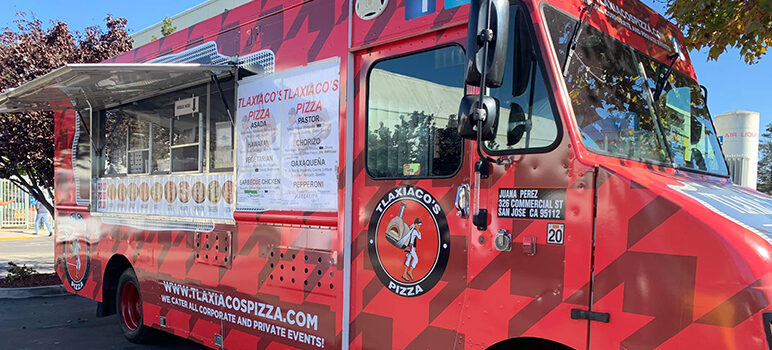Before the coronavirus pandemic hit, the Tlaxiaco Pizza food truck sold hundreds of pizzas everyday. On a good day, it could make upwards of $1,300.
For the entire month of April, the food truck sold two pizzas.
Juana Perez, who runs the business along with her husband and brother-in-law, somehow found a way to maintain hope in the midst of deep adversity. “I kept on telling them and myself that tomorrow would be better and we have to continue,” she said.
Perez’s dogged persistence and determination paid off, as business has slowly picked up in the last couple of weeks. It coincided with a grant of $10,000 that was awarded to Tlaxiaco Pizza and 141 other small businesses in San Jose.
Thanks to a generous donation from tech giants Apple and Google and the efforts of the Silicon Valley Community Foundation and Opportunity Fund, each business received $10,000 for relief from the devastating economic toll of the coronavirus.
When Perez was notified via phone call that her business had been awarded the grant, she was in utter disbelief. After all, Perez had previously applied for three different loans and grants only to be turned down each time.
“I almost cried when I got the call because this was our last opportunity for approval [of a loan or grant],” she said. “And we really needed the money.”
Apple and Google combined to donate $1.5 million to be used for small business relief in San Jose, of which $75,000 was used by Opportunity Fund to process the grant applications, disburse the funding and administer the program.
Opportunity Fund is a nonprofit community development finance institution that since 1994 has provided micro-financing to low- and moderate-income entrepreneurs, focusing on serving business owners who are women, immigrants and people of color.
The Opportunity Fund staff worked with the Local Assistance Team in the city’s Emergency Operations Center to center racial equity and community needs in the grant criteria and outreach efforts. Jeff Ruster, assistant director of economic development, and Michelle McGurk, assistant to the city manager, have been working for the city’s COVID-19 response relief efforts and assisting community-based organizations for low income residents and small businesses.
The grants targeted micro-businesses that were least likely to access capital and federal relief funds. “The program was designed to work with very small mom and pop businesses,” Ruster said. “The PPP [Paycheck Protection Program] went to larger small businesses, so we wanted to make sure our funds went to the mom and pop, coffee shops, pizzerias, the sole proprietors, the individual-owned businesses. That’s why we worked with Opportunity Fund because they were a natural conduit for something like this.”
Ruster credited Apple and Google for quickly responding to the call of aiding small businesses. According to the city of San Jose, small businesses represent more than 97 percent of all active businesses and generate nearly 43 percent of all employment in San Jose. More than half of the 55,000 small businesses are immigrant-owned and more than 60 percent are owned by people of color.
Given the amount of funds available and the targeting of micro-businesses, the grant criteria were as follows: the business had to be located in the city; the owner had to live in Santa Clara County and have a low or moderate-income below 80 percent of the area median income; the business had to be a micro-enterprise with five or fewer employees; it must have existed prior to Jan. 31, 2020; and it had to have experienced approximately 25 percent loss of income due to COVID-19.
The Silicon Valley grants provided a vital boost since most sole proprietors and small business owners have limited cash reserves.
Perez has two children and is five months pregnant with a third, and the $10,000 grant provided her peace of mind—at least for the time being.
“We didn’t want to sell the food truck because this was my dream, my husband’s dream and my brother in law’s dream,” she said in an interview. “The money will help with our payments and keep us going. We had to continue because I have my two kids, rent to pay, food to buy and friends to pay back. We’ve been thankful to have friends who helped us get the business started [in 2016].”
Tlaxiaco Pizza cooks its food in a stone wood oven at 800 degrees. It specializes in using ingredients with Oaxaqueno flavor, producing a variety of eats such as pizza tacos. In April, when the business was at its nadir, Perez vividly remembers waiting for customers to show up only to see empty streets and companies all around her.
“It was a very sad month,” she said.
Fast forward to a weekday in mid-July, when Tlaxiaco Pizza catered an event for 20 people at a sprawling San Jose home.
Even though business is far from the pre-pandemic days, Perez is optimistic for the future, thanks in no small part to the grant she received. “It was hard to believe at first,” she said. “But God is good and he found the people to help us.”


> focusing on serving business owners who are women, immigrants and people of color.
A good idea poisoned by the obligatory and unfair introduction of tribalism.
Keep your stinking money unless you’re going to be fair to EVERYONE.